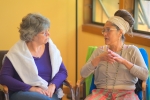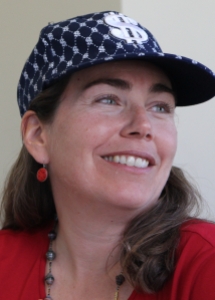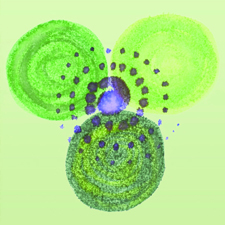Fundraising. Money. Economics.
Strange topics for me. I hovered near the bottom of the sales list every year when my Girl Scout Troop sold cookies. I hated my economics class in college. Today, I struggle to keep putting myself out there to market my book, Big Topics at Midnight.
Nevertheless, most of my life has circled around economics, especially fundraising. I am passionate about spiritual transformation, global justice and partnership across our differences, and that journey has lead me directly into money.
Money that I invest, spend or give to organizations working in these areas close to my heart. And money that I invite other to give in support of those organizations.
Last week I signed up for yet another fundraising committee.
Did I mention that I don’t really like fundraising?
This past January, I began my third Be Present, Inc. national 18-month training institute. For my first training, which started in 2003, I was a participant soaking up everything I could learn. Though initially I had a difficult time understanding all that was going on in the room, I knew that something was happening that I’d never seen before. I wanted to learn how to know who I was outside of the distress of anything that stopped me from fully participating in relationships/partnerships with everyone from my husband, Howard, to my grown kids, to friends, and to my work in organizations dear to my heart. I wanted to know how to really listen with my full self. And I deeply desired to be in partnerships that sustained and grew even in the midst of conflict across our many historical divides.*
That training was one of the most important of my life, and was part of the nudge to dive into the writing of Big Topics at Midnight.
In my second training, Be Present at the Table: Effecting Sustainable Change in Philanthropy, and this third one, The National Training Institute on Race, Gender, Power and Class, I have been on the leadership team.
 Many organizations talk about the importance of diversity in their programs, but Be Present makes sure this actually happens. Too often, money stops diversity in its tracks: In order to attend, you must either pay the fee or apply for one of a few scholarships.
Many organizations talk about the importance of diversity in their programs, but Be Present makes sure this actually happens. Too often, money stops diversity in its tracks: In order to attend, you must either pay the fee or apply for one of a few scholarships.
At Be Present trainings, no one is turned away due to lack of funds. Registration fees are on a sliding scale and support is offered for individuals to creatively raise money to cover these costs.
Stopping there would allow a few more people to attend, but the trainings would remain minimally diverse.
However, in addition to personal fundraising, all of the participants fundraise. That means that everyone, including people like me who have enough funds to easily pay our own way, works together to make sure that all of the registration fees are covered at a level that covers the site/training and organizational leadership costs.
Normally, folks like me are exempt from this fundraising process, leaving the responsibility for ensuring a diverse  training on the laps of people with limited economic resources.
training on the laps of people with limited economic resources.
Be Present understands that every one of us benefits with the full diversity of people in our trainings. Therefore, we work together to make sure that happens.
This is what is required for trainings and conferences to embody a new paradigm of justice and inclusivity.
No matt er how often I try to turn away from working the money, my commitment to waking up to the big topics and experimenting with keeping my values in line with behavior keeps bringing me back to the money. And fundraising.
er how often I try to turn away from working the money, my commitment to waking up to the big topics and experimenting with keeping my values in line with behavior keeps bringing me back to the money. And fundraising.

